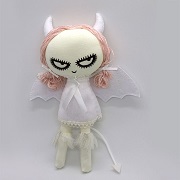|
Ah whoops, totally forgot about that. Yeah that makes sense.
|
|
|
|

|
| # ? May 19, 2024 17:19 |
|
By same place they mean same tower zone. The world has several towers in charge of dealing with the dead people and they seem to be based around geographical areas. Thats why everyone in the tower we know have been japanese. Same time means they have to be processed at roughly the same time since the volume is so large that people would already be assigned to another if too much time passes in between.
|
|
|
|
I am glad this one is a two-parter, I can't wait to see where it goes.
|
|
|
|
Quantum Arbiting: You affect the outcome by trying to figure it out. So is the black-haired woman playing cards with the old lady to waste some time until the second guest arrives, or is it getting serious for her?
|
|
|
|
|
Lurking Haro posted:Quantum Arbiting: You affect the outcome by trying to figure it out. Well Decim was affected by Noname's accusations in the latest episode so maybe. On the other hand, the next episode is called Storyteller and that storybook has been lingering around for a while now. Nice to see the system finally being called out on how hosed it is though, and we got a nice ambiguous double void to showcase it.
|
|
|
|
Well. That was certainly depressing.
|
|
|
|
|
A good episode.
|
|
|
|
Wait how did Shimada die?
|
|
|
|
This show sucks. I'm going to give it a 3 on My Anime List and I think I'm going to drop it on the penultimate episode to piss off fans of the show who look at My Anime List.
|
|
|
|
MonsterEnvy posted:Wait how did Shimada die? Got stabbed by the rape dude and bled out
|
|
|
|
That bummed me out, but in a good way, because this show is good as hell
|
|
|
|
Hot drat, that was an amazing episode. Disturbing and depressing as hell, but brilliant.
|
|
|
|
I hope this is a sign they've found their stride. Because
|
|
|
|
Well, we all knew it was coming in some form, but holy hell that was an impressively vicious dismantling of a main character and his worldview. Justice requires victims. 
|
|
|
|
I was waiting for Decim to pull a Rainn Wilson and be all "FALSE. 1st hand experience is not a pre-requisite for criticism; indeed objectivity is often helpful in unbiased feedback"
|
|
|
|
|
AnacondaHL posted:I was waiting for Decim to pull a Rainn Wilson and be all "FALSE. 1st hand experience is not a pre-requisite for criticism; indeed objectivity is often helpful in unbiased feedback" I kind of have a split mind on where I stand on this, morally. Here's the thing: ^^ isn't valid in the detective's case, and that's because he isn't an arbiter, as much as he wants to believe he is one. He is a detective and therefore his job is to solve crimes - he has no right to judge, only to accuse from as objective a standpoint as possible. The difference between him and Decim is that Decim is delivering an absolute judgement as if from on high. He isn't there to figure out what to think about the "defendants", he's there to effectively categorize them as absolutely good or absolutely bad. Now, we could all argue till the end of time whether absolutism is a good or bad thing, but given that this absolutism is inherent to the premise of the show, let's not. My point is that since Decim is there to deliver an absolute judgement, his methods too must be absolutely objective. Yes, the kid could have been helped and put back on the sane person's path, but in the specific state in which he exists in Quindecim, we can agree that he was definitely a vile, broken person, and Decim's job is to absolutely judge that, not what he could have been. So the problem not that the system is broken - the system works perfectly fine given its specific purpose - but why such a system exists. Why not just throw all dead people to the void, fair or not? Why not just reincarnate everyone, and don't bother judging them? But for the same reason as the whole absolutism thing, lets not argue about that. So the real problem is, why did Nona think any of this was a good idea? Is she trying to sabotage the very system she's trying to run?
|
|
|
|
ViggyNash posted:I kind of have a split mind on where I stand on this, morally. Here's the thing: ^^ isn't valid in the detective's case, and that's because he isn't an arbiter, as much as he wants to believe he is one. He is a detective and therefore his job is to solve crimes - he has no right to judge, only to accuse from as objective a standpoint as possible. Why shouldn't we argue that? It's precisely the criticism of the system brought up in this very episode.
|
|
|
|
Nono's experimenting around because there is already something inherently wrong with the system because every arbiter eventually questions the system and is then transferred out and replaced.
|
|
|
|
Darth Walrus posted:Why shouldn't we argue that? It's precisely the criticism of the system brought up in this very episode. Because unless the show straight up says "This system was not meant to make absolute judgements in place of our absent God," there is no valid argument against the system. The problem with absolutism is that you have to deal in, well, absolutes, whether or not you like the implications. What we need to question is not whether the system itself should be aloud to deal in absolutes, but whether the God that it is representative of should have the power to judge in absolutes. The problem with that question is that we've now crossed the line from a moral discussion to a religious one where we could all get made at each other indefinitely and get nowhere along the way. I'm not sure I'm ready to see ADTRW have a religious discussion, which could either be highly amusing or utterly terrifying.
|
|
|
|
This was a really good episode but depressing as poo poo. Decim was a complete dick in this one though. For someone who's suppose to be an impartial arbiter, he basically set up the brother to fail. The brother already had his revenge, 'won' the game and it looked like he was set to get reincarnated.
|
|
|
|
So I take it that the final shot before the ED was to show us what happened to both of them? Because poo poo. 
|
|
|
|
ViggyNash posted:Because unless the show straight up says "This system was not meant to make absolute judgements in place of our absent God," there is no valid argument against the system. The problem with absolutism is that you have to deal in, well, absolutes, whether or not you like the implications. What we need to question is not whether the system itself should be aloud to deal in absolutes, but whether the God that it is representative of should have the power to judge in absolutes. The problem with that question is that we've now crossed the line from a moral discussion to a religious one where we could all get made at each other indefinitely and get nowhere along the way. I'm not sure I'm ready to see ADTRW have a religious discussion, which could either be highly amusing or utterly terrifying. The show has already spelled out that the assessment system is arbitrary bullshit dealt out by clueless fucks, and is seriously questioning why a vetting process is necessary and who has the right to do it. Sorry, dude, but this is in fact the theme this show is addressing, so saying 'let's not talk about it because goons' would probably require closing the thread altogether. Kegslayer posted:This was a really good episode but depressing as poo poo. "Justice requires a victim." This has been a standard part of the assessments since that guy murdered his opponent in Billiards. They just brought it to the forefront this episode to illustrate how profoundly hosed-up it is.
|
|
|
|
Darth Walrus posted:The show has already spelled out that the assessment system is arbitrary bullshit dealt out by clueless fucks, and is seriously questioning why a vetting process is necessary and who has the right to do it. Sorry, dude, but this is in fact the theme this show is addressing, so saying 'let's not talk about it because goons' would probably require closing the thread altogether.
|
|
|
|
Morality doesn't have to be assumed to be absolute to be valid. It's like you guys have never met e: God's physical absence as a metaphor for his figurative absence is pretty well-worn ground too, but I'll hold my tongue on that till I catch up with the show. Tuxedo Catfish fucked around with this message at 17:44 on Mar 7, 2015 |
|
|
|
Just as an idle thought with all the system-breaking shenanigans going on, what do you reckon the odds are of Decim having a human eye under his hair?
|
|
|
|
Tuxedo Catfish posted:Morality doesn't have to be assumed to be absolute to be valid.
|
|
|
|
Paracelsus posted:Viggy is making an important point though, because where you're going ends up with the question of who is worthy to judge God. If God exists and His morality is absolute, then humans finding it distasteful or inconvenient is utterly irrelevant. If a god exists and their morality isn't absolute, then either there is some higher morality that serves as a means to judge them by (in which case we're most likely back to the first scenario), or there is no morality by which to judge them and once again the human perspective has no weight. Since in the show some sort of God or god exists (even if absent), scenarios where God/a god doesn't exist aren't relevant. The only way what you're going for works is if human morality is somehow superior to divine morality, and then you've got to explain why without doing something like claiming that your preferred form of human morality is absolute, which is a) ludicrous and b) the religious argument that Viggy was hoping to avoid. Arguments about what system of morality to apply to someone other than yourself are unavoidably religious in form. Why are you supposing this show accepts that human morality must necessarily be subordinate to divine morality? That absolutely does not fit with the irreverence this show has treated the celestial bureaucracy with so far. Power does not equal morality, and the presence of a god does not mean that what they do must automatically be right in the same way that the presence of an absolute dictator does not make that dictator's actions moral.
|
|
|
|
Paracelsus posted:It can be valid as applied to yourself, but if you want to use it to bind others you have a serious problem. If God exists but doesn't have (or have knowledge of) absolute moral authority, then this is just as true of him as it is of me. A God who isn't perfectly good or perfectly knowing is just powerful, and while you are of course free to posit that power is a form of moral authority... well, now I'm saying the same thing back to you, aren't I?  e: Also, I wasn't just talking about personal morality. "If you want to use it to bind others you have a serious problem" implies that consensus has greater moral weight, which is itself a moral judgement; without referring back to God or another absolute source, how do you prove that that's correct? I don't think you can, but I still agree with you, so hurray for consensus! (But it's not absolute!) Tuxedo Catfish fucked around with this message at 18:16 on Mar 7, 2015 |
|
|
|
Darth Walrus posted:Why are you supposing this show accepts that human morality must necessarily be subordinate to divine morality? quote:That absolutely does not fit with the irreverence this show has treated the celestial bureaucracy with so far. Power does not equal morality, and the presence of a god does not mean that what they do must automatically be right in the same way that the presence of an absolute dictator does not make that dictator's actions moral. Tuxedo Catfish posted:If God exists but doesn't have (or have knowledge of) absolute moral authority, then this is just as true of him as it is of me. A God who isn't perfectly good or perfectly knowing is just powerful, and while you are of course free to posit that power is a form of moral authority... well, now I'm saying the same thing back to you, aren't I? quote:e: Also, I wasn't just talking about personal morality. "If you want to use it to bind others you have a serious problem" implies that consensus has greater moral weight, which is itself a moral judgement; without referring back to God or another absolute source, how do you prove that that's correct? I don't think you can, but I still agree with you, so hurray for consensus! (But it's not absolute!) Basically, you can posit the non-existence of God and conclude the non-existence of morality, but you can't conclude the immorality of God from any starting point. You can conclude the immorality of a god only by reintroducing something like unto God into the system. As we can deduce from our experience of our own existence, humans are not God, so you can't put human judgment on the throne of God. It's not entirely clear where the show is on the god/God spectrum, but the existence of a divine order that controls death and reincarnation would seem to imply something God-like somewhere in the machine, even if the agents implementing it are just gods. One could argue that the godlings' actions are not in conformity with the will of the God, but to do that you'd have to figure out what the will of God is, and that's always the trick.
|
|
|
|
Paracelsus posted:But if God/a god doesn't have absolute moral authority in the scenario, neither do you. All you are doing in calling their actions wrong is saying "I don't like this," which, while probably true, leaves the other party free to say "too bad, whatcha going to do about it?" No, there's a distinct difference between saying "that's wrong" and "I don't like that" even if there is no absolute standard of what is or isn't wrong. They communicate different concepts, as evidenced by the fact that I can dislike something and do it anyways because I feel it's morally correct or vice-versa. Of course morality is subject to disagreement and perspective, but that's not the same as "morality does not exist." It just means that you have to think about it as what it is: a tangle of conflicting perspectives, often not even fully or consistently expressed, that people adhere to for personal reasons. Paracelsus posted:By "binding others," what I meant was the possibility that the moral system you are claiming has any applicability to them whatsoever such that you would be able to say "you are wrong" and have it be a meaningful communication of anything other than personal disapproval. Consensus between humans carries no moral weight. You say "personal disapproval" as if that's a dismissal, but it's not actually enough to dismiss it. If morality isn't absolute, that just means that instead of residing in God's hand or in the fabric of the universe or whatever, it's a human creation. It's whatever we decide it is, and it makes perfect sense to talk about "wrong according to X" or even just "wrong to X." Consensus is a good starting point because it excludes only solipsists and sociopaths (loosely speaking), and because a moral consensus translates easily to actually doing whatever the consensus decides; it's close to the raw practicality of might-is-right, but includes the interests of everyone who agrees that other peoples' interests also matter. Paracelsus posted:Basically, you can posit the non-existence of God and conclude the non-existence of morality, but you can't conclude the immorality of God from any starting point. You can conclude the immorality of a god only by reintroducing something like unto God into the system. As we can deduce from our experience of our own existence, humans are not God, so you can't put human judgment on the throne of God. Sure you can, I already explained how last post: if God isn't perfectly good. If you define God as perfectly good then you can't conclude that he's immoral (obviously) but there are lots of conceptions of divinity that don't include that clause. It's easy to conceive of a creator who exercises absolute power over our souls and judges us arbitrarily, or malevolently, or in a well-meaning way which is nonetheless abhorrent to us. Those conceptions are also a useful way of talking about the unfairness of the world, and looking at it in a more or less pessimistic light. Saying "you can't put human judgement on the throne of God" is irrelevant; it's not what I'm suggesting. What I am suggesting is tearing morality from the throne of God and placing it down here with the rest of us.
|
|
|
|
Paracelsus posted:The show might well not accept it, but that doesn't mean that the non-acceptance is ultimately coherent. 1984 was about an absolute, undefeatable regime that defined reality as it saw fit. Does that mean that we, as readers, are not allowed to criticise the Party?
|
|
|
|
Still catching up with the show, and I noticed something that people didn't seem to mention earlier in the thread when it came up. When Decim explains the story of the Buddha lowering a thread into Hell, to save a sinner whose single act of compassion was deciding not to kill a spider, he mangles the moral of the story. The point is that Kandata, the sinner, has a chance at redemption but loses it when he tries to keep the chance at salvation all to himself. This is somewhat similar to the system the arbiters use, pushing people into a single extreme situation to get the true measure of their soul, but Decim doesn't get it -- he thinks the moral is "it would have been better if the other sinners never saw the thread at all." The person in charge of redemption is making nearly the same error as Kandata himself. Also, amusingly, for the person who thought that signified a Buddhist interpretation of the afterlife -- it's actually much stronger evidence of the Buddhist / Christian synthesis thing they have going on. The story of Kandata and the thread isn't a traditional parable, but rather a short story from a children's magazine published in 1918, and a direct retelling of a Christian story about an evil old woman who once gave an onion to a beggar. (Which appears in The Brothers Karamazov, although I'm not sure if Dostoevsky invented it or just retold it himself.)
|
|
|
|
drat, Paracelsus, you're arguing my point way better than I did.Tuxedo Catfish posted:No, there's a distinct difference between saying "that's wrong" and "I don't like that" even if there is no absolute standard of what is or isn't wrong. They communicate different concepts, as evidenced by the fact that I can dislike something and do it anyways because I feel it's morally correct or vice-versa. You're talking about morality from a philosophical perspective, and about the practical implementation of it, but the show defines morality as the strict guideline that arbiters use to judge the dead, and it's that morality that we're discussing. Essentially, morality in that universe is an objective set of rules. Therefore, feeling that something is morally correct - which is a subjective, philosophical notion of morality - has no bearing on the objective, structural definition of morality that is the basis of the show. Tuxedo Catfish posted:Sure you can, I already explained how last post: if God isn't perfectly good. If you define God as perfectly good then you can't conclude that he's immoral (obviously) but there are lots of conceptions of divinity that don't include that clause. It's easy to conceive of a creator who exercises absolute power over our souls and judges us arbitrarily, or malevolently, or in a well-meaning way which is nonetheless abhorrent to us. Those conceptions are also a useful way of talking about the unfairness of the world, and looking at it in a more or less pessimistic light. See, this leads into defining the nature of god and that leads into religion and yeah let's not. Ironically, I've did the same thing as Decim and by asking people to not go there, I caused them to go there. This is too meta Darth Walrus posted:1984 was about an absolute, undefeatable regime that defined reality as it saw fit. Does that mean that we, as readers, are not allowed to criticise the Party? No, because they are not the divine rules of the universe, they are just dictators of a human nation. We exist outside that world and therefore can judge that world from our own perspective. That is also not what anyone is arguing so why even try to make that point? e: Tuxedo Catfish posted:Still catching up with the show, and I noticed something that people didn't seem to mention earlier in the thread when it came up. drat, that is a really neat way of foreshadowing this episode. ViggyNash fucked around with this message at 20:15 on Mar 7, 2015 |
|
|
|
ViggyNash posted:You're talking about morality from a philosophical perspective, and about the practical implementation of it, but the show defines morality as the strict guideline that arbiters use to judge the dead, and it's that morality that we're discussing. Essentially, morality in that universe is an objective set of rules. Therefore, feeling that something is morally correct - which is a subjective, philosophical notion of morality - has no bearing on the objective, structural definition of morality that is the basis of the show. I'm not even halfway caught up and show has already demonstrated over and over again that the arbiters are fallible, ignorant, and in some cases even capricious. Why would a morality with "an objective set of rules" require a council of fallible arbiters to determine what happens? e: You can go ahead and answer with spoilers, I don't mind and I'll probably be up to date by the time I read it anyways. ViggyNash posted:See, this leads into defining the nature of god and that leads into religion and yeah let's not. Why not? This stuff is relevant, and complicated, and the show is deliberately invoking it. It's not like we're in polite company. Tuxedo Catfish fucked around with this message at 20:22 on Mar 7, 2015 |
|
|
|
Wait a moment, I'm calling Kyrie Elaison to this thread.
|
|
|
|
Lucy Heartfilia posted:Wait a moment, I'm calling Kyrie Elaison to this thread. nononononono for content, the site spoiled the coming episode. Its No names judgement
|
|
|
|
Cao Ni Ma posted:for content, the site spoiled the coming episode. Its No names judgement Ohhhh. Ohhh. I'm really looking forward to it now.
|
|
|
|
ViggyNash posted:drat, Paracelsus, you're arguing my point way better than I did. Objective? What about any part of the system so far has been objective? Ginti treats his assessments as gladiatorial entertainment, and his perspective is implied to be the norm. Even the arbiters who take their jobs seriously have dodgy methodology and an appalling failure rate. As for 1984, we absolutely exist outside this universe. I, for one, don't expect that when I finally kick the bucket, I will be challenged to a game of table-tennis by a glum bartender and his hot sidekick. This is simply Airstrip One on a cosmic scale, and you're giving the Party a reverence they have been explicitly shown not to deserve because they happen to have superpowers. I mean, come on, surely this isn't the first anime you've ever watched (or even the first work of fiction you've ever watched) with an evil or incompetent god? poo poo, you can even look at real-world mythology - the Greek gods were prime dickbags, and were treated and acknowledged as such even by those who worshipped them. I mean, seriously, our plucky band of heroes punching God in the dick is an anime cliché. Why are you having such a tough time with this? Darth Walrus fucked around with this message at 21:06 on Mar 7, 2015 |
|
|
|
Darth Walrus posted:Objective? What about any part of the system so far has been objective? Ginti treats his assessments as gladiatorial entertainment, and his perspective is implied to be the norm. Even the arbiters who take their jobs seriously have dodgy methodology and an appalling failure rate. The system itself is meant to be objective, and the dolls that are the arbiters are meant to be objective agents of that system. But, obviously, the system has some giant cracks. Darth Walrus posted:As for 1984, we absolutely exist outside this universe. I, for one, don't expect that when I finally kick the bucket, I will be challenged to a game of table-tennis by a glum bartender and his hot sidekick. This is simply Airstrip One on a cosmic scale, and you're giving the Party a reverence they have been explicitly shown not to deserve because they happen to have superpowers. I mean, come on, surely this isn't the first anime you've ever watched (or even the first work of fiction you've ever watched) with an evil or incompetent god? poo poo, you can even look at real-world mythology - the Greek gods were prime dickbags, and were treated and acknowledged as such even by those who worshipped them. ... What? I'm just going to say that I'm considering God as an abstract entity atm since we have no idea who or what he/it is supposed to be. All we know is that he supposedly defined, or at least is represented by, this system, and by extension the moral doctrine the system is meant to uphold. That then implies that this entity God has absolute authority over the dead, or at least the system is acting as such, and therefore I'm simply considering him/it as the fundamental structural basis of their world, which also encompasses the moral absolutism inherent to the system.
|
|
|
|

|
| # ? May 19, 2024 17:19 |
|
Have they said how many episodes there will be of this?
|
|
|






























